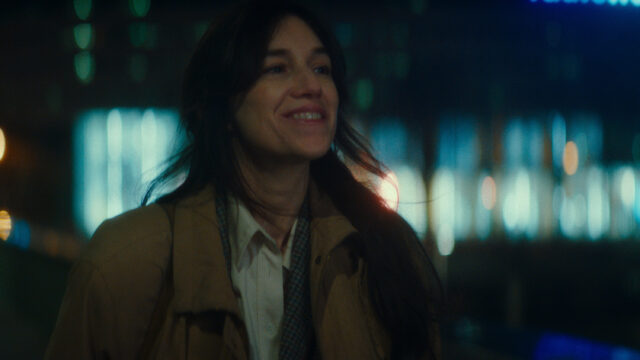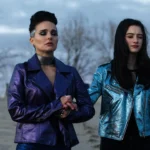The Passengers of the Night: Ride Along, by Scott Nye

The Passengers of the Night exists pointedly where movies must reflexively, somewhere between real life and a dream. It begins on the night of the 1981 presidential election, electing France’s first Socialist president, but Elisabeth (Charlotte Gainsbourg) has more immediate concerns – her husband has firmly left her and her teenage children Matthias (Quito Rayon-Richter) and Judith (Megan Northram, and she needs a job for the first time in her adult life. With no experience, she sets off into the world, fumbling a few opportunities before landing a job screening calls for a late-night radio show hosted by Vanda (Emmanuelle Béart). This gives her a window into the nocturnal world of Paris, albeit from the safe remove of a (definitely-overly-ostentatious) radio suite.
Not only does the show feature people calling in for personal advice from Vanda, but she’ll occasionally have ordinary people come into the studio for one-on-one discussions of their lives and circumstances. Enter Talulah (Noée Abita), an 18-year-old girl on the edge of homelessness. Swept up in her story and taking pity on her, Elisabeth invites her to stay in her guest room. One night turns into a few days, and Talulah gets along well with Judith and especially Matthias, that they form a sort of new family out of the one Elisabeth’s husband left behind.
The film does a couple time-jumps as it goes along, showing the way they grow and change over the course of a few years, retaining that ethereal foothold in the night through Elisabeth’s job. The film’s title comes from how Vanda addresses her listeners, imbuing a sense of passive momentum to their lives that the protagonists reflect. Elisabeth likes her job, but will never see it apart from its necessity; she loved her husband, but latches onto the life she can live now; in one of the film’s most moving passages, she visits her daughter after she’s moved away and reflects on how she hadn’t really registered the finality of that transition.
And what of Talulah, the most transient character? She’s a slight agent of chaos, embroiling Matthias especially into trouble he might not otherwise meet, but the film – and Elisabeth, when she can – treats her with a steady understanding of what’s led her there and all she’s doing to get out of it. But she too is a passenger with her own wave to ride. She takes Matthias to see Eric Rohmer’s Full Moon in Paris, his 1984 masterpiece, which starred Pascale Ogier. Talulah looks to Ogier with a mix of amusement, recognition, admiration, and envy, the sense that she both feels she already is her and aspires to one day become her. And why not? Ogier is hip, attractive, and independent – she has free nights, a boyfriend, a suitor, two apartments, and the world at her fingertips.
Only the film shows this all unravel for her, the unhappiness she’s masking or ignoring, and the pain she’s inadvertently causing. A few months after its release, Ogier would die of a heart attack, the result of a heart murmur she’d had since she was young and some drug use. Talulah has the one of those someone could control, but which circumstances are making difficult for her to wrangle. The potential result there looms in the background, Ogier’s life a warning for where it could all go.
Writer/director Mikhaël Hers has made several well-liked films prior to this, but this is his first to be distributed stateside, no doubt boosted by the star power of Gainsbourg and Béart. The latter has more of a supportive role, never taking center stage, always there to reflect Gainsbourg, who is incredibly sweet in a deceptively difficult role. Elisabeth must be many things to many people, but can’t help but reveal herself in each circumstance. Gainsbourg makes these revelations as much a surprise to her as to everyone else, as though she’s just missed the train as the words have left the station. Her performance carries a lot of trauma Elisabeth has experienced alongside the love she feels for all she has.
It’s a minor-key movie in a lot of ways, fitting into familiar territory for those who watch a lot of mid-level French dramas; Hers doesn’t do much to distinguish himself from the pack, but invests a lot of integrity into its proceedings.





























